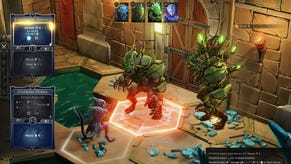Devs should think about their legacy, says Spector
DICE 2013: Epic Mickey designer implores creators to make games for more than just their adolescent selves
During his DICE Summit presentation today, Warren Spector did not talk about his latest game, Epic Mickey 2, or the recent closure of his Junction Point Studios. Instead, the 57-year-old developer looked back on his decades in the game industry, and reflected upon the changes he's gone through both personally and professionally.
One of those changes was his taste in games. Spector said when he was younger, he wanted adrenaline rush and spectacle. He wanted transgressive content parents would disapprove of. He was attracted to games that would alienate and shock people. He wanted experiences that could be played for 100 hours or more.
"We need to think about things that are relevant to normal humans, and not just the geeks we all used to be"
Warren Spector
As he's gotten older and free time has grown more scarce, Spector is drawn increasingly to shorter experiences, and ones with a greater thematic diversity.
"I have no interest in guys who wear armor and swing big swords," Spector said. "I've been the last space marine between earth and alien invasion already. I really just don't need to go there anymore. I want content that is relevant to my life, that is relevant to me, that is set in the real world."
He name-checked Heavy Rain and Telltale Games' The Walking Dead series as two of the best gaming experiences he's had in recent years. They were games that weren't about body-builder heroes or planet-changing events; they celebrated the ordinary and the everyday, Spector said. They made hugs compelling, or the simple act of playing with a child.
In some ways, they were much like Spector's body of work, where the player has an impact on the game's story, where the way they play determines the narrative outcome. But unlike Spector's previous works, they didn't require twitch skills or a hefty time commitment.
Spector referenced Heavy Rain director David Cage's own DICE talk from the previous day. Spector said he agreed with everything Cage said about the need for gaming to grow up, but disagreed about all the solutions Cage proposed in his talk.
He didn't go further into criticisms of Cage's solutions, but instead proposed his own.
"We need to think about things that are relevant to normal humans, and not just the geeks we all used to be," Spector said.
Spector stressed the need to work more in fostering the talents of younger developers, worrying more about helping other developers achieve their own goals. He offered one of his own mistakes in the hopes that they could avoid repeating it.
"I hope you will not follow my path and put aside those geekish things at an earlier age than I did, and really discover that you don't have as much time as you think," Spector said.
"This is not just about making money. I used to be embarrassed to say that we create art. I am no longer embarrassed to say that"
Warren Spector
There's no time to waste making games because somebody else needs to make some money, Spector said. He doesn't know how many more projects he'll be able to finish in his career, so he's determined to make sure every one of them is special.
"I think more about legacy than I probably should," Spector said. "I want to leave something behind. And I think that's probably true of most people who've done something for 30 years. And I hope all the 20 and 30-something folks think about that. Think about what you're leaving behind. This is not just about making money. I used to be embarrassed to say that we create art. I am no longer embarrassed to say that."
Whatever his own legacy winds up being, Spector won't be remembered as humorless. The veteran developer wrapped up his talk with a tongue-in-cheek solicitation for job offers, drawing a round of laughs from the crowd.









